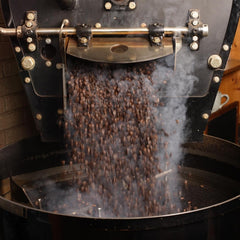All the Coffee Roasts You Need to Know
Whether you are visiting a coffee shop or picking out a batch of instant coffee, you have to decide between roasts. Though this choice may be confusing at first, understanding different coffee roasts is easier than you might think.
To learn about coffee roasts, keep reading. This guide fully explains what roasting is, how it impacts your coffee, and what some of the most common roast terms mean. Scroll down for more!
What Is Roasting?

Simply put, roasting is the process that turns harvested coffee into the rich, fragrant, and delicious dark brown beans used to make a cup of Joe. Without roasting the beans, it is impossible to make a traditional cup of coffee.
Immediately after being harvested, coffee beans are green, spongy, and soft. Although the caffeine of the coffee bean is still there, the beans are unrecognizable to the modern drink before they are harvested. It is only because of the harvesting process that dark brown coffee beans with deep flavor come about.
How It Works

How it works is that roasting exposes the coffee beans to heat. This heat forces a chemical change to happen within the beans. This chemical reaction changes the color, texture, and aroma of the bean. The green beans turned dark brown, and the beans that were once soft are now hard, allowing them to be ground down. Coffee beans have that delicious coffee smell and taste only after roasting.
The specifics of the roasting process vary from roaster to roaster, but most commercial roasters follow the same process. Commercial roasters use a heated spinning drum. Beans are put inside this drum, and the roaster controls the heat, gas removal, and timing.
The beans first undergo a drying phase. This is when all of the excess water evaporates. The coffee beans undergo other phases, including the Maillard reaction, which is a reaction between sugar and amino acids. Eventually, the coffee beans will start popping, much like popcorn. This signifies that the coffee is losing density, resulting in a more aromatic flavor.
After that, the roaster works their magic in order to perfect the sweetness and flavor profile of the coffee beans.
Roasting Is Harder Than You Might Think

Unlike roasting s’mores or hot dogs over a fire, roasting coffee beans is incredibly difficult. The best coffee is roasted by expert roasters that have spent their entire lives perfecting the roasting process. The best roasters not only know how to roast the beans but read the beans as they go along.
What makes roasting coffee beans so difficult is that it is not an exact science. Not all beans need the same amount or level of roasting as others. As a result, expert roasters know what to look for from the beans to determine when the beans have reached their peak appearance, flavor, and texture.
This ability to read beans is incredibly difficult. It is one that requires a lot of skill. Allowing the beans to roast for just a few extra seconds can make the difference between a delicious batch of beans and a ruined batch. Needless to say, roasting coffee beans is more of an art form than it is a science.
Not to mention, the trick is using the roasted coffee beans as quickly as possible. Once the coffee beans have been roasted, that flavor will gradually start to decrease. That’s why an old bag of coffee taste stale in comparison to a fresh batch.
Understanding Roasts

How long coffee beans are roasted affects the richness, flavor, and caffeine level of the beans. Roasters designated names for their coffee bean roast to help buyers understand the coffee that they have purchased.
Roasters typically classify their coffee in one of four ways: light, medium, medium-dark, and dark. These names refer to the color category of the beans, but they can also help you understand the richness and caffeine content of the drink.
Unfortunately, there is very little industry standardization for roast classification. What this means is that a light roast from one roaster isn’t going to taste the same as another light roast. Still, these four color classifications are helpful in determining what coffee is best for you.
Generally speaking, lighter roasts have a lighter color, less rich flavor, but more caffeine. In contrast, dark roasts are rich and dark in color, but they have less caffeine. Let’s take a closer look at these roasts so that you understand what you are getting from these cups of coffee.
Light Roast

Light roasts have the lightest brown color. Many people prefer light roast because it has a milder flavor and higher amounts of coffee. This lighter flavor is attributed to the fact that the bean was not roasted long enough for oils to break through the surface. As a result, there is no oil on these beans.
Medium Roast

Medium roast, sometimes referred to as American roast, has a medium brown color. Its flavor is slightly stronger than light roast, but it isn’t overwhelming. The roast also lacks an oily surface. Medium roast is the favorite in America.
Medium-Dark Roast

As its name suggests, medium-dark roasts are between medium and dark roasts. It has a rich, dark color, as well as some oil on the surface. Its aftertaste is slightly bittersweet, but it is still more palatable than dark roasts.
Dark Roasts

Dark roast has been roasted the longest, and it has the most pronounced bitterness. The beans are shiny and black and have an oily surface. Dark roasts can be slightly dark to completely charred. The darker the roast is, the less acidity there will be.
Try Your Favorite Today!

Now that you know all the most important coffee roasts, you can order a cup with confidence! Try them all to find your favorite. If you don’t like bitter, stick to the light roast side. However, go with a darker roast if you want a more rich, bitter flavor.



















